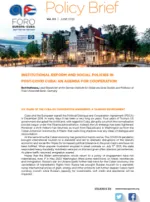Institutional reform and social policies in post-covid Cuba: an agenda for cooperation

Foro Europa Cuba Policy Brief nº 2 (2022)
Cuba and the European signed the Political Dialogue and Cooperation Agreement (PDCA) in December 2016. In many ways it has been a very long six years. Four years of Trump’s US government disrupted the world and, with regard to Cuba, abruptly cut short the normalisation process begun under the Obama administration. Instead, the US embargo has been tightened.
Moreover, a shrill rhetoric has returned, as much from Republicans in Washington as from the Cuban-American community in Miami, that casts long shadows over any ideas of dialogue and reconciliation.
At the same time the Cuban economy has gone from bad to worse. The COVID-19 pandemic brought international tourism to a standstill and led to dramatic disruptions of the island’s economic and social life. Hopes for increased political tolerance in the post-Castro era have not been fulfilled. When popular frustration erupted in street protests on July 11th 2021, the state responded heavy-handedly. Hundreds were put on trial and given often draconic jail sentences. As plane traffic resumed, emigration soared.